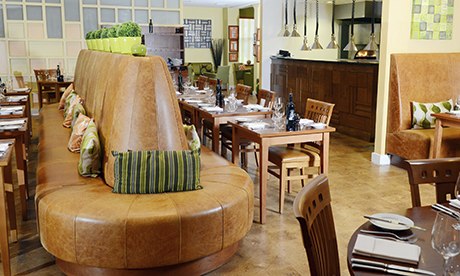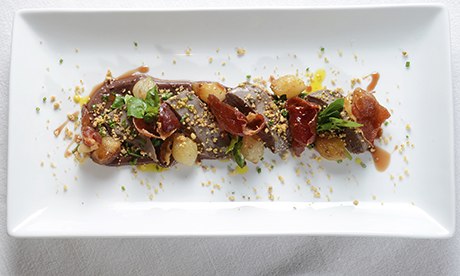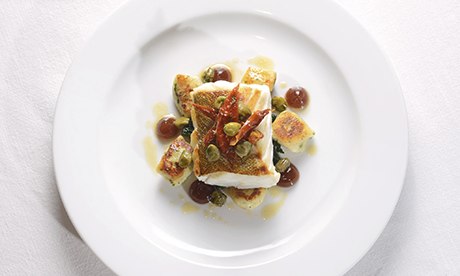
Canteen chic: Hotel TerraVina’s ‘institutional’ interior. Photograph: Victoria Jones/Solent News
Hotel TerraVina: Woodlands, Netley Marsh, New Forest, Hampshire (02380 293 784). Meal for two: £90-£120
Nobody visiting the Hotel TerraVina could ever forget where they were. They wouldn’t be allowed to. The walls are plastered with cuttings about the place: bevel mounted, under glass, wooden frames. It doesn’t matter how small the publication. It’s all here, glowering down at you, challenging you not to be impressed. My eye flicked from restaurant review to local newspaper report to trade magazine feature. At any moment I expected to come across a certificate for swimming in your pyjamas.
I doubt this review will make it under glass. It’s not that the Hotel TerraVina is without redeeming features. The staff are kind and solicitous. As the “Vina” bit of the name suggests wine-heads will love it. But there’s something so self-regarding about the food, so mannered and overengineered, that it all ends up being exhausting. I arrived sprightly, I left needing a long lie down. I also arrived expecting to like it. The fact is I felt connected to the Hotel TerraVina. A decade ago I wrote a novel about a restaurant critic who decides to apologise for everything he’s ever done wrong. For complicated reasons he needed to have a Francophone name that could also have an English pronunciation.
One day I stumbled across an interview with Gerard Basset, a renowned sommelier and one of the founders of the Hotel and Bistro du Vin group. I liked his small chain very much, and the name worked perfectly: it’s pronounced Ba-say in French; in English, as in hound. Marc Basset was born. After a while my fictional restaurant critic expanded into the real world: Marc Basset became the name under which I booked countless restaurant tables. I did that for years, indeed until last week. Now I’ve told the story it’s time to retire Mr Basset. He can return to being entirely fictional.
Gerard Basset won many awards, sold the hotel chain and opened this lump of bright red brick – think child’s playset red brick – in the New Forest, as a hotel dedicated to wine. The list is impressive: long, yes, but well organised and with lots of choice at price points below £30. It’s serious about wine without being pompous. It was its reputation for wine that had first made me consider coming.

Pigeon breast with black pudding purée. Photograph: Victoria Jones/Solent News
A few weeks ago David Everitt-Matthias, chef at Le Champignon Sauvage in Cheltenham – which has just won the OFM award for outstanding contribution – sealed the deal by telling me one of his former chefs was now cooking there. Everitt-Matthias is a very good thing. His earthy approach to ambitious food, the way he makes humble ingredients sing, has always been thrilling. If one of his team was deep in the woods with Mr Basset, I had to go.
Unfortunately the whole thing is overheated, both figuratively and literally; we had to open a door by our table that led out to the garden, to let in a breeze. The decor is also odd: angular and blocky with a lot of Fanta orange-varnished wood. There’s a touch of the institutional to it, as if it were a retirement home for hip older people who are not yet prepared to go the way of Laura Ashley prints. The food is equally self-conscious. A selection of hot “tapavinas” brings something called lamb bonbons, which sounds sweet and playful. They are deep-fried balls of braised, tangled and brutally dry lamb. It’s a canapé in training for the Heimlich manoeuvre. Onion bhajis are just a tub of dry strands of caramelised onions, as though someone had sent us out a bowl of the garnish for another dish.
Many of the dishes seem to be constructed words first, as if they wrote what sounded like a cool description and then had to cook it. “Flamed mackerel” sounds butch and rugged. What we get are two thin strands of adequately cooked fillet. An accompanying gooseberry purée doesn’t just cut through the oiliness; its acidity slashes and slashes again. A mouthful of that and your lips quickly pucker to a cat’s bum. There are lumps of granola. Like I’d had for breakfast that morning. It’s an ectopic ingredient, secreted into the middle of a meal it has no business being a part of. It’s terribly drying.
That’s a repeated theme. Too much of this food is the Tena Lady of gastronomy, drying everything in its path. A “black pudding purée” is an ugly grey smudge and nowhere near moist enough to do the business with pigeon breast, however perfectly rare it is served. I end up looking to the oiliness of fried Parma ham to get the whole dish moving, but it’s stopped in its tracks by hazelnut crumb. It’s the same problem with a piece of cod loin with fried basil gnocchi and a balsamic gel. The fish crumbles into the capers, and it all gets stuck in the gel.
Far better is a plate of big gamey venison faggots, clearly made with offal. This is proper ballsy cooking. And, praise be, there is even a sauce – though it is fiercely reduced to the point where it starts to stick my tongue to the roof of my mouth. Matron, pass the chisel.

Too clever by half: cod loin. Photograph: Victoria Jones/Solent News
The kitchen does know how to cook individual ingredients. There’s technique on show. The problem lies in putting dishes together. Things are missed out. There’s too much grandstanding. They attempt to send us out a freebie of a pumpkin velouté with a crisp wild mushroom arancini. (I insist it must be paid for.) I can see why they wanted us to try it; the pumpkin velouté is rich and deep and sugary, and has you whacking your tongue around your gums. The arancini is nicely done. Roasted pumpkin seeds add crunch. But even this is relentless. The velouté needs to be lighter. Like those framed cuttings, it’s just overkill.
As is a white chocolate parfait with a walnut ice-cream that fades unto nothing against its brutal sweetness. A rhubarb soufflé is pert and bright and, being simplicity itself, the very best thing we eat. And unlike the wine list none of this feels like good value. Starters are from £7 to £11, mains from £14 to low 20s. For that you expect your lunch to be a pleasure rather than something to be stumbled through. You want to be fed, not lectured to. You want it all to make sense and it doesn’t. Oh well, at least it saves on the framing costs.
■ For food from a chef with an interesting pedigree, try the Red Lion Freehouse at Pewsey in Wiltshire. Guy Manning worked at London’s Chez Bruce and Thomas Keller’s Per Se in New York before heading back to England. They make everything in house “from the lime cordial to the ketchup”. The food also has a sense of place: the menu might include a ravioli of Wiltshire truffles. There are hints of all those high-end kitchens in the cooking’s finesse, but it never loses sight of the fact that it is a pub. (redlionfreehouse.com)
■ This week sees the publication of Noma chef René Redzepi’s intriguing book A Work in Progress: Journals, Recipes and Snapshots. It’s both a cookbook and a year in the life of one of the world’s most influential cooks. It has a foreword from Lars Ulrich of Metallica. Go figure.
■ Those who think gastronomic London is too smug by half will be delighted: Tripadvisor’s latest global top 10 fine-dining list doesn’t include a single joint in the capital. The only British restaurant listed is Raymond Blanc’s Le Manoir at number 7.